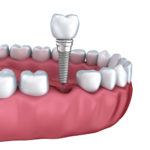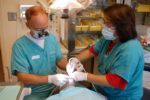Table of Contents
Dental Hygiene Instruments Used For Oral Health Cleanings

Routine teeth cleanings are a critical part of maintaining optimal oral health hygiene and care. Dental hygienists often recommend teeth cleanings at least twice yearly for patients with optimal oral hygiene habits and a clean mouth. Some dental patients may require more frequent teeth cleanings if they aren’t flossing and brushing regularly. The purpose of a professional teeth cleaning is to remove plaque, any built up tartar and stains or food debris that has developed between teeth or on the gums. Having professional teeth cleanings is an effective way and necessary aspect of good oral healthcare.
It’s no secret that visiting the dentist can be quite anxiety-inducing for some patients. Whether it is fear of the dentist’s office or the tools, that worry of the unknown is not uncommon among some patients. Dentistry instruments are sanitized, sterile tools used to apply stringent cleanings of the teeth and gums. These tools are incredibly safe, effective, and quality controlled to ensure the care and safety of the patient. It’s important to learn more about dental hygiene instruments, including what they are, why they are used for a basic understanding of professional dental hygiene care.
Guide To Common Dentistry Cleaning Tools
Mouth Mirror
Arguably the most easily identifiable dentistry object is the mouth mirror. The least daunting and least threatening tool, the mouth mirror is used by the dentist to examine inside the patient’s mouth with ease. It is often connected to a metal stick to allow for easier navigation and examination inside the mouth. Although you may not be able to identify any signs of plaque build-up or cavities on your teeth upon first glance, that does not mean that there is no tooth decay or gum disease located deeper within the mouth. Not only does this instrument allow the dentist to examine the teeth, gums and tongue more easily, it makes it easier for the dentist to move your tongue to the side of your cheek without having to use their hands to ensure your comfort.
Sickle Probe
The sickle probe is essentially a hooked reaping probe, also known as a dental adventurer, which is used to identify signs of cavities, periodontal disease and other threats to your oral health.

This tool has a long handle with a pointed hook at its end. It is mainly used to navigate inside the pockets between the teeth to remove any food debris or plaque that is stuck and scrape it away. If the dentist identifies a visible cavity, they may use the tip to investigate it further. This instrument is an essential tool for most preventative dental procedures and dentistry.
Scaler
The sickle probe is primarily used to remove smaller plaque and tartar particles, whereas the scaler is used for the removal of more substantial plaque build-up. Plaque that has not been removed for extended periods of time, likely from lack of flossing or proper brushing can lead to much larger dental problems. Minor plaque build-up on teeth is natural, however, it should be removed daily with flossing and regular brushing. If there is more plaque to remove, the scraping from the scaler may not be as comfortable, however, it is vital to prevent you from developing further tooth decay issues.
Suction Tool/Saliva Ejector
The saliva ejector is far more humorous in appearance than it is scary. The saliva ejector/suction tool is a long tube attached to a vacuum suction, which is used to remove any saliva particles from the inside of the mouth. It may make vacuum-like noises and patients may feel the ejector tube stick to the inside of the cheek, but it is completely harmless. Dental treatments that involve the use of water will likely use the saliva ejector throughout the treatment to clear out the water that has accumulated within the mouth.
Dental Drill
Some patients fear the dental drill mainly because of the sound this instrument makes. As odd and sometimes irritating as it may be, the dental drill is by far the most effective way to remove plaque and tooth decay prior to filling a cavity. The dental drill spins at above 250,000 rpm while dispersing water into the mouth. This allows the drill to remain cool.

The electric drill’s vibrations on the teeth can feel strange at times, however, it is not painful, especially if the dentist administers anaesthetic to the patient.
Dental Syringe
This dentistry tool delivers a numbing solution to the inside of the mouth. A dental syringe is slightly longer than a regular needle to allow the dentist to accurately hit the location where anaesthetic is being inserted. The initial injection may cause slight discomfort as with any needle insertion, however, that sensation will quickly dissipate and numbed from the anaesthetic. If you have a fear of needles or are uncomfortable with dentist appointments, it’s in your best interest to close your eyes or look away once the syringe is inserted. Some dentists will administer a local anaesthetic before using the dental syringe to dull the needle prick insertion and put the patient at ease.
Moulds
If you require a dental crown, cap or a mouthguard, the dental hygienist will likely need to get a mould of your teeth. Moulds are frames that fit inside the mouth and are filled with a soft substance. Once the mould is placed inside the patient’s mouth, they will be asked to bite down into the substance-filled frame, which creates a mould of their teeth. Although the moulding material may feel cold and feel quite odd, you only have the mould inside your mouth for a few seconds to allow the dentist to get an accurate example.
Why Do You Need Regular Dental Cleanings?
Regular dental checkups are a critical part of maintaining proper oral health care and dental hygiene. Regardless of how frequently you brush and floss, you should always schedule dental cleanings at least once every six months to ensure your teeth and gums are in optimal condition. Professional dental cleanings are not only a critical part of maintaining bright, white teeth; they have a significant impact on your overall health as well. Lack of proper oral hygiene can lead to a number of severe illnesses that extend beyond dental health issues. 
From bone loss to cancer and cardiovascular disease, individuals that neglect proper, professional oral health care could be at risk of developing these illnesses. The additional benefits of professional teeth cleanings include the following:
- Your dental hygienist can remove the majority of the stains on your teeth and the discolouration on it. This leaves patients with a much brighter, whiter and celebrated smile.
- Having your teeth regularly cleaned can prevent periodontal disease, which leads to early tooth loss and decay.
- Oral cancer is one of the most common and dangerous forms of cancer across the nation. However, oral cancer can be curable when detected at an early stage during a teeth cleaning.
- There is a common link between cardiovascular disease and periodontal disease. Yearly teeth cleanings can prevent gum disease and reduce the chances of heart disease, strokes and heart attacks.
- During dental cleanings, dental hygienists can also look for any signs of fractured teeth, fillings or early signs of tooth decay.
- Most dental plans cover regular teeth cleanings, which makes it more accessible for most individuals.
- Gum disease and diabetes are interlinked. Patients living with diabetes are at a much higher risk of developing periodontal disease. Professional teeth cleanings can remove tartar and plaque build-up, which can help keep your oral health in control.
- Regular dental cleanings can prevent cavities from developing or spot them before they worsen. Preventive dentistry goes a long way in maintaining proper oral health. When plaque and tartar are able to develop and remain on the teeth, it can corrode the tooth enamel and cause severe decay. Ensure you’re regularly brushing and flossing along with rinsing your mouth with mouthwash to avoid cavities and tooth decay from developing.
- Regular dental cleanings help prevent bad breath in a patient’s mouths. Not only is mouth odour unpleasant, it can sometimes be indicative of a more serious oral health problem that has been neglected. Teeth cleaning is the most effective way to maintain a clean and odour-free mouth!
Belman Dental Centre has been serving the Toronto community for over 20 years. Committed to providing comprehensive oral health care from general dentistry, cosmetic dentistry, emergency dentistry and family dentistry, Belman Dental Centre provides dental care for everyone.

They pride themselves on combining skill, experience, passion and expertise to deliver healthy and beautiful, bright smiles. Belman Dental Centre has obtained a well-respected reputation for providing high-quality dental treatments for children, adults and seniors.
Visit their website to schedule an appointment for a dental treatment at:
Author’s Bio

Ellie King is a Content Writer for BreezeMaxWeb: Online Media Solutions writing blogs and content for the company’s clients’ websites. Graduating from Brock University with a Bachelor’s Degree in Journalism, Ellie ventured as a freelance journalist for a year covering politics, social issues, music and culture and has published articles based on said subjects.





